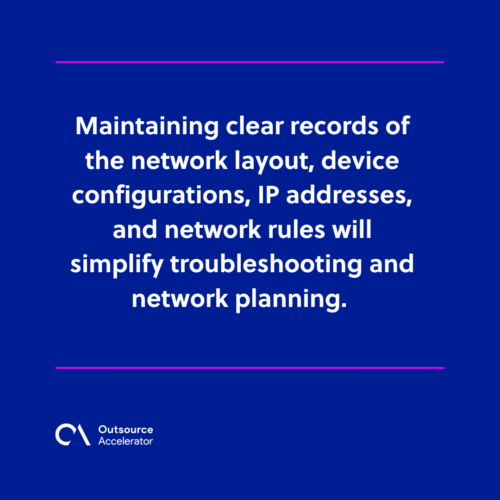A complete guide to network management services

Businesses heavily depend on their computer networks for internal and external communication. To keep things running smoothly, they use network management services.
These services are essential for maintaining and optimizing the networks, ensuring uninterrupted operations.
In this article, we’ll explore the various network management services firms can avail of, their benefits, best practices, and future trends.
Brief overview of network management services
Network management services take care of computer networks. These services incorporate the use of tools and processes to keep the networks running smoothly, performing well, and safe from harm.
Network management services providers ensure businesses have reliable and efficient networks.
5 types of network management services
Network management encompasses five primary categories known as FCAPS:
- Fault
- Configuration
- Accounting
- Performance
- Security management.

These are designed to oversee various network-related procedures:
Fault management
Fault management is monitoring and detecting network issues, errors, or malfunctions. It quickly identifies and resolves problems to minimize network downtime and ensure smooth operation.
Configuration management
Configuration management handles and controls network devices’ configurations. These include tasks like backing up configurations, version control, and deploying consistent settings across devices.
Accounting management
Accounting management tracks network resource usage, such as data and bandwidth consumption, and other metrics. It assists with billing, capacity planning, and understanding network performance.
Performance management
Performance management focuses on monitoring and optimizing the performance of network devices and resources. It measures network response time, throughput, and utilization to ensure efficient operation.
Security management
Security management encompasses tasks related to safeguarding the network from unauthorized access, attacks, and vulnerabilities. This involves implementing and maintaining security measures like firewalls, access control lists, and encryption.
Benefits of network management services
Network management services offer numerous advantages for businesses and organizations, regardless of size or industry.
Some essential advantages of using these services include:
- Enhanced network performance. Network management services ensure optimal network performance with minimal downtime.
- Improved reliability and availability. Growing organizations require network management services to study and prepare for network expansion.
- Increased network security. As cyber threats increase, network security management is essential. These services set up firewalls, intrusion detection systems, and access controls to protect against unauthorized access and data breaches.
- Cost-effectiveness and resource optimization. Efficient network management reduces urgent fixes and expensive emergency repairs. It saves the organization money on day-to-day operations and resource usage.
Best practices in network management services
Network management services use strategies and methodologies to ensure smooth and efficient computer network operations.
Here are some essential best practices:
Proactive monitoring and maintenance
Monitoring and performing proactive maintenance regularly is vital for effective network management. Addressing small issues before they escalate into major problems ensures a stable and reliable network.
Regular backups and disaster recovery plans
Regular backups of critical network setups and data are essential for quick recovery. These are vital, especially in case of unforeseen incidents or data loss.
Network documentation and asset management
Maintaining clear records of the network layout, device configurations, IP addresses, and network rules will simplify troubleshooting and network planning.
Having a comprehensive network map facilitates efficient management and maintenance.

Future trends in network management services
As technology evolves, network management services are expected to undergo significant transformations to accommodate the complexities of technology.
Here are some future trends that will shape network management services:
Automation and AI
AI algorithms can analyze real-time network data, detect anomalies, predict issues, and take actions to optimize performance and troubleshoot. This trend reduces manual intervention and improves efficiency.
Automation and AI in network management will likely increase in the coming years.
Intent-based networking (IBN)
Intent-based networking (IBN) simplifies management. Administrators specify desired outcomes, and the network configures and optimizes itself accordingly. This boosts security, agility, and responsiveness.
Network security integration
Network security integration strengthens cybersecurity. Advanced security features and AI are used to detect and respond to breaches instantly.
Software-defined networking (SDN)
Software-defined networking (SDN) allows software control of network elements, making management more dynamic and scalable. It enables business operations to adapt to their changing requirements and traffic patterns.
Network function virtualization (NFV)
Network function virtualization (NFV) virtualizes services like firewalls and routers for efficient deployment and management.
NFV adoption leads to faster service deployment, resource utilization, and cost savings.
5G and edge computing
The rollout of 5G and edge computing requires advanced network management. Specialized tools and techniques are needed for managing edge devices and integrating 5G with existing infrastructures.
Outsourcing network management services to the right service provider
In the future, network management services will become more automated, smarter, and secure, adapting to modern networks and new technologies. These changes will provide organizations with faster, stronger, and safer networks to meet evolving business requirements.
Outsourcing network management services to specialized providers allow businesses to access expertise and continuous monitoring. They can also leverage advanced tools without needing an in-house network management team.
This allows organizations to focus on their core competencies while leaving network maintenance to the experts.







 Independent
Independent




